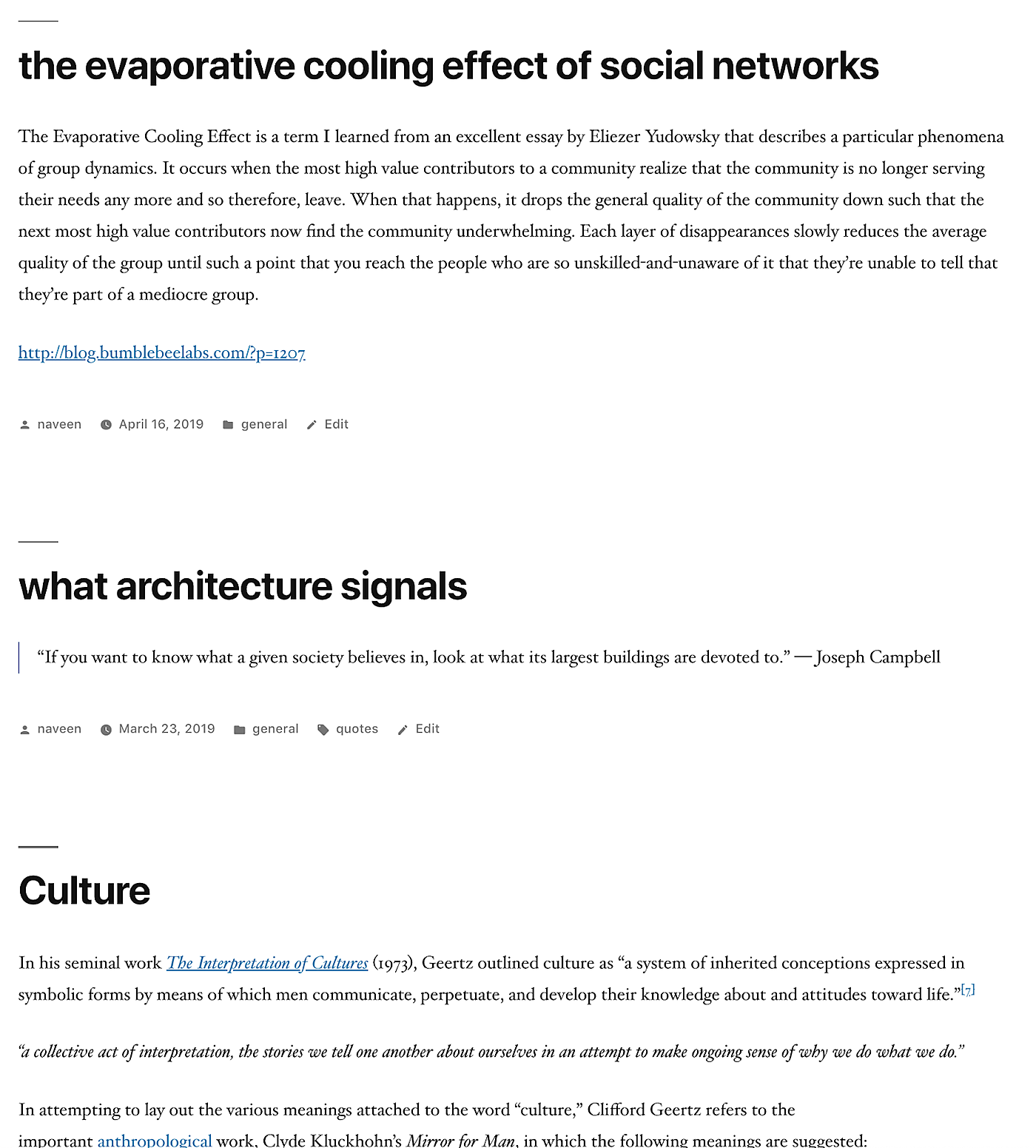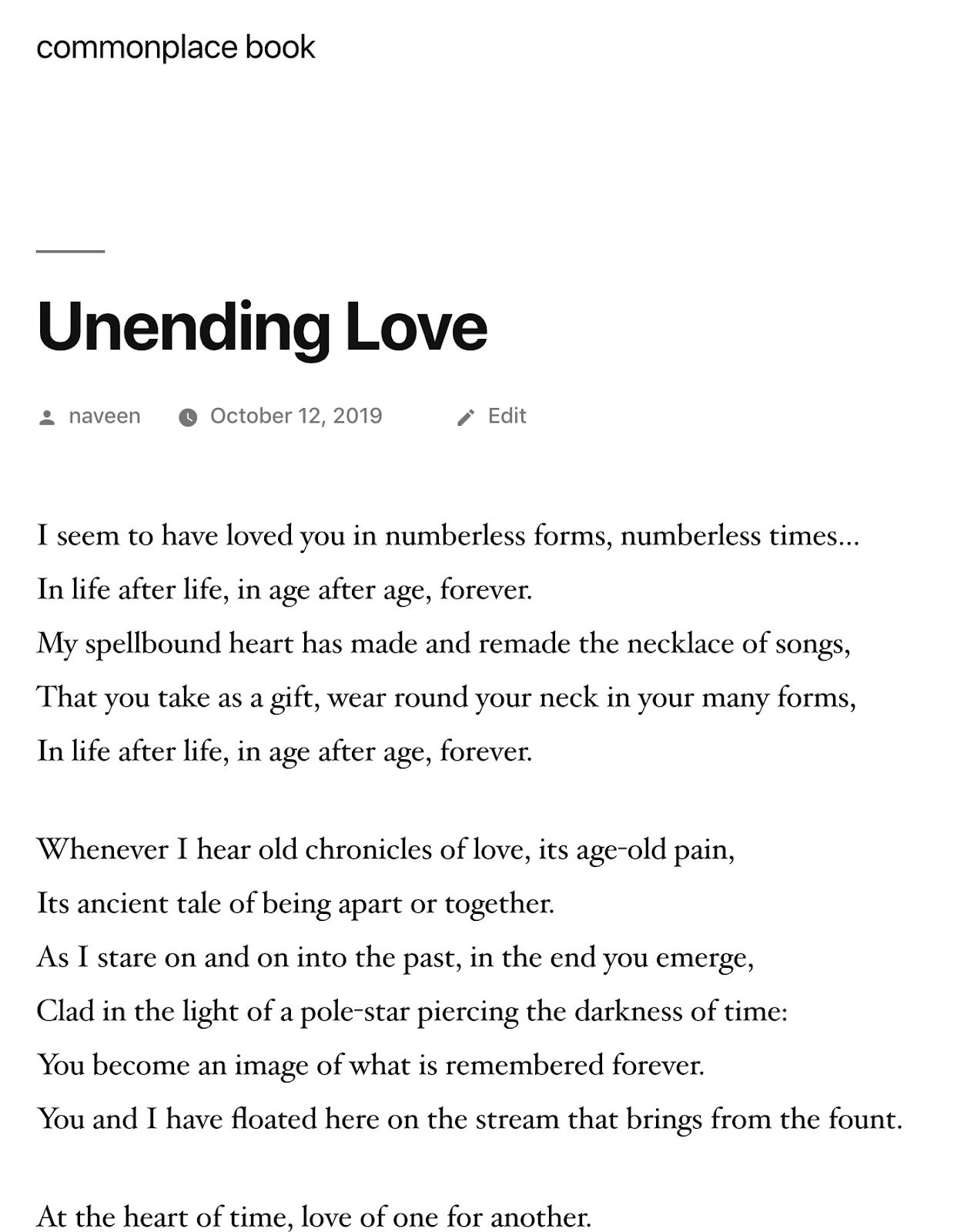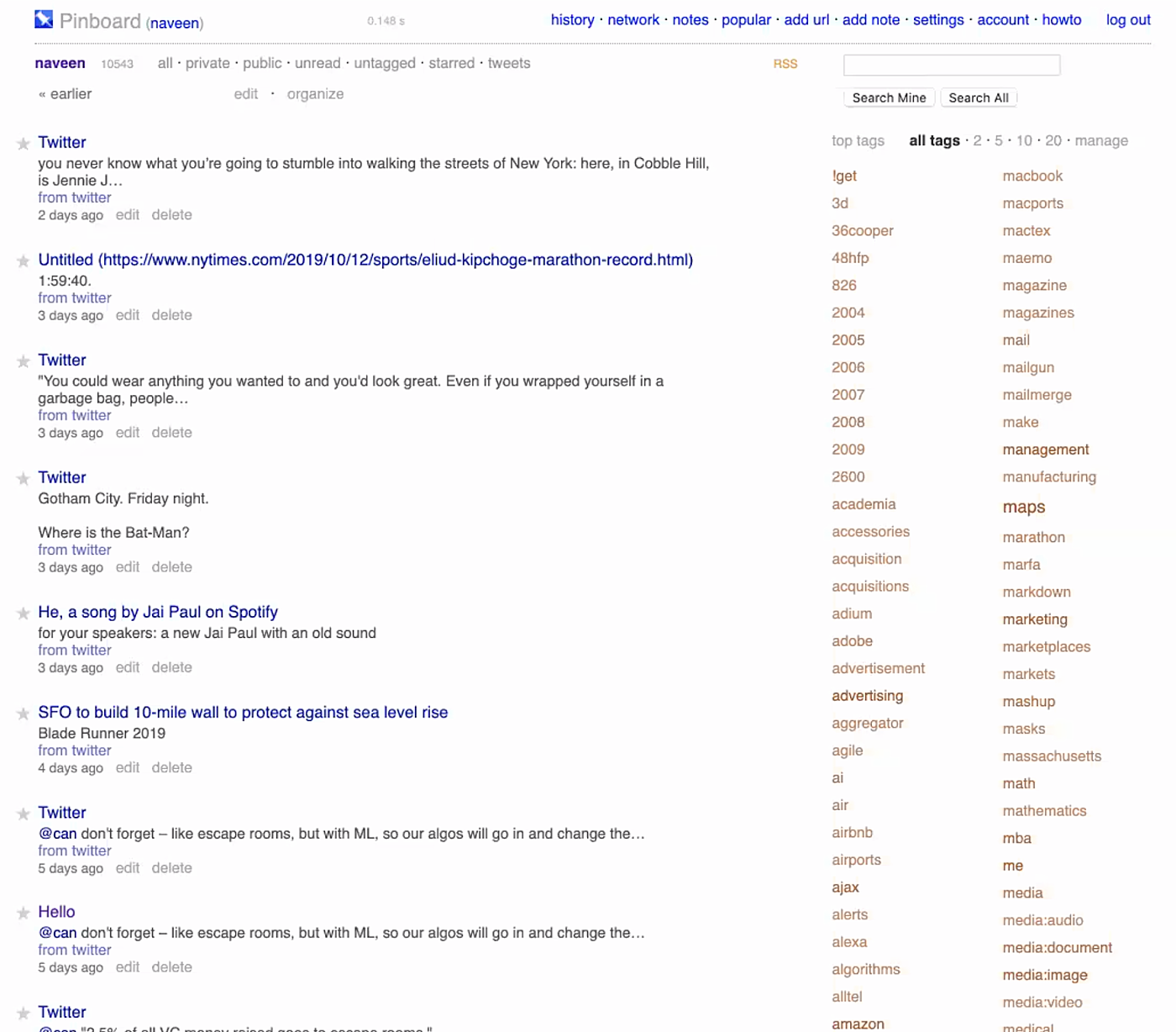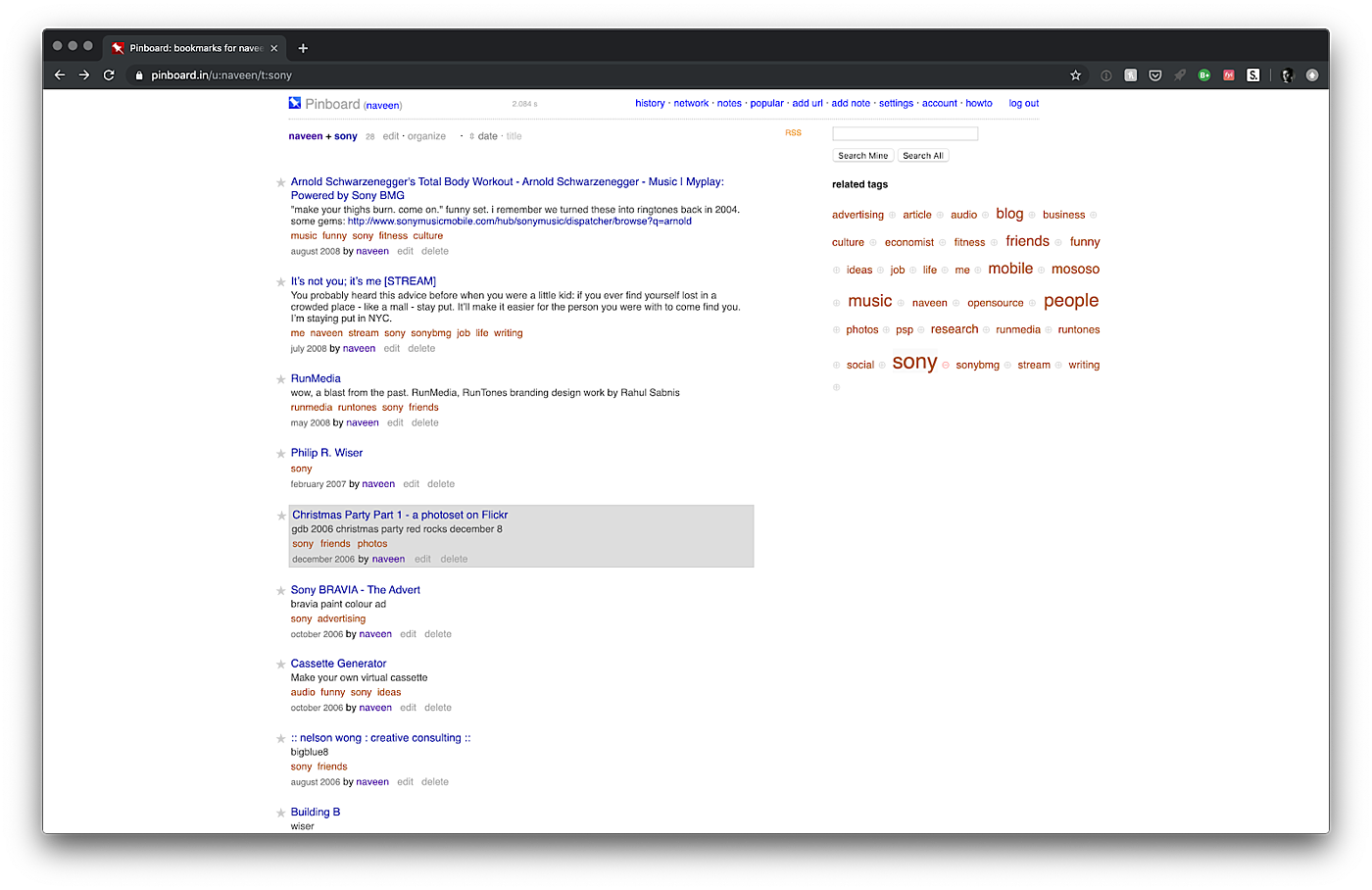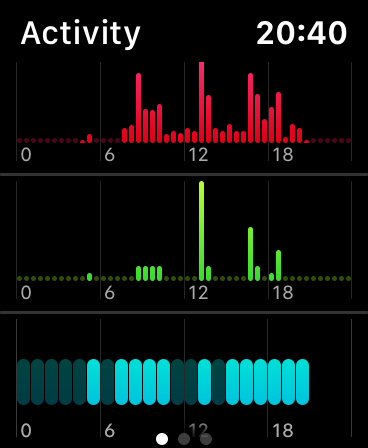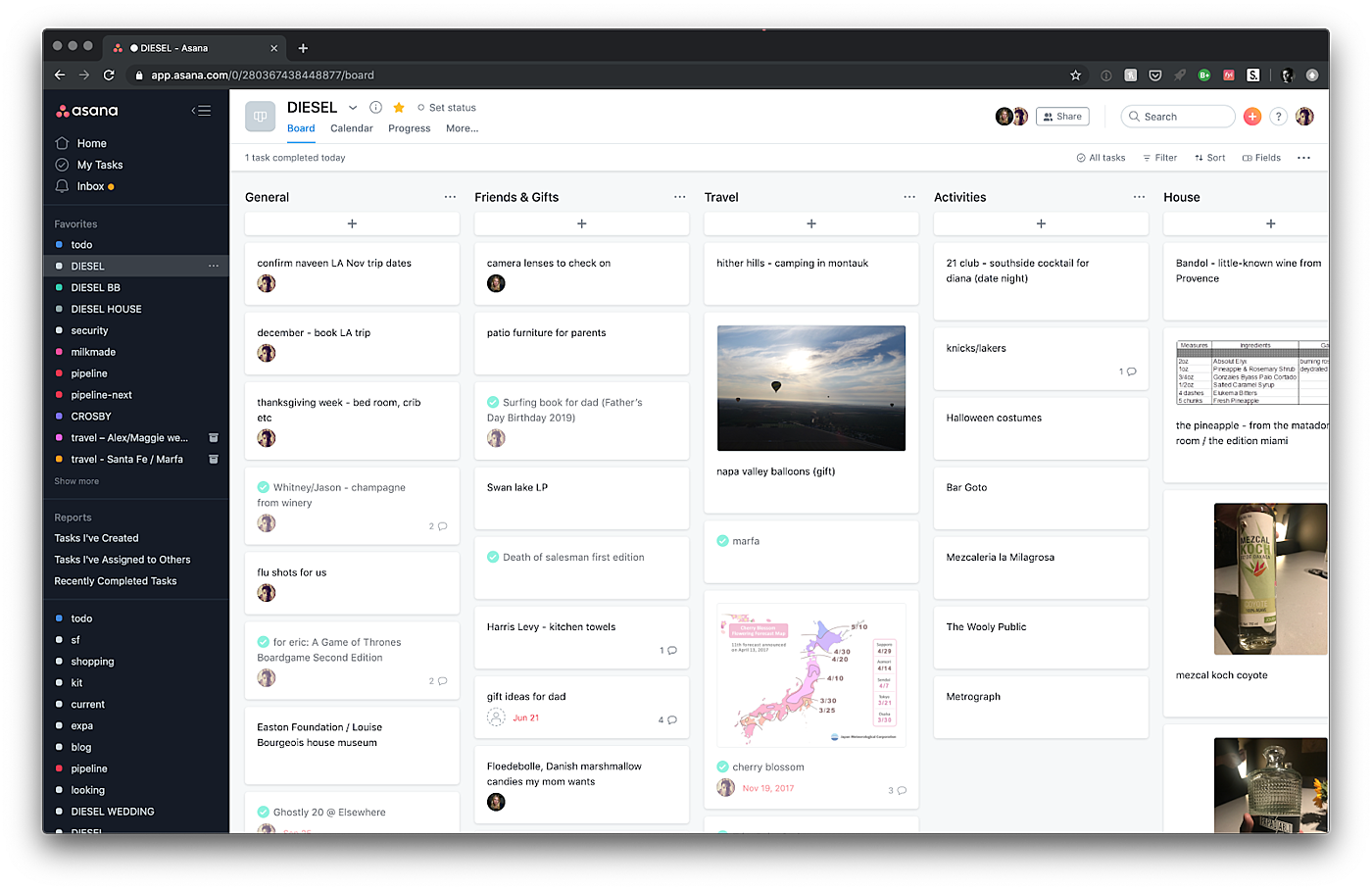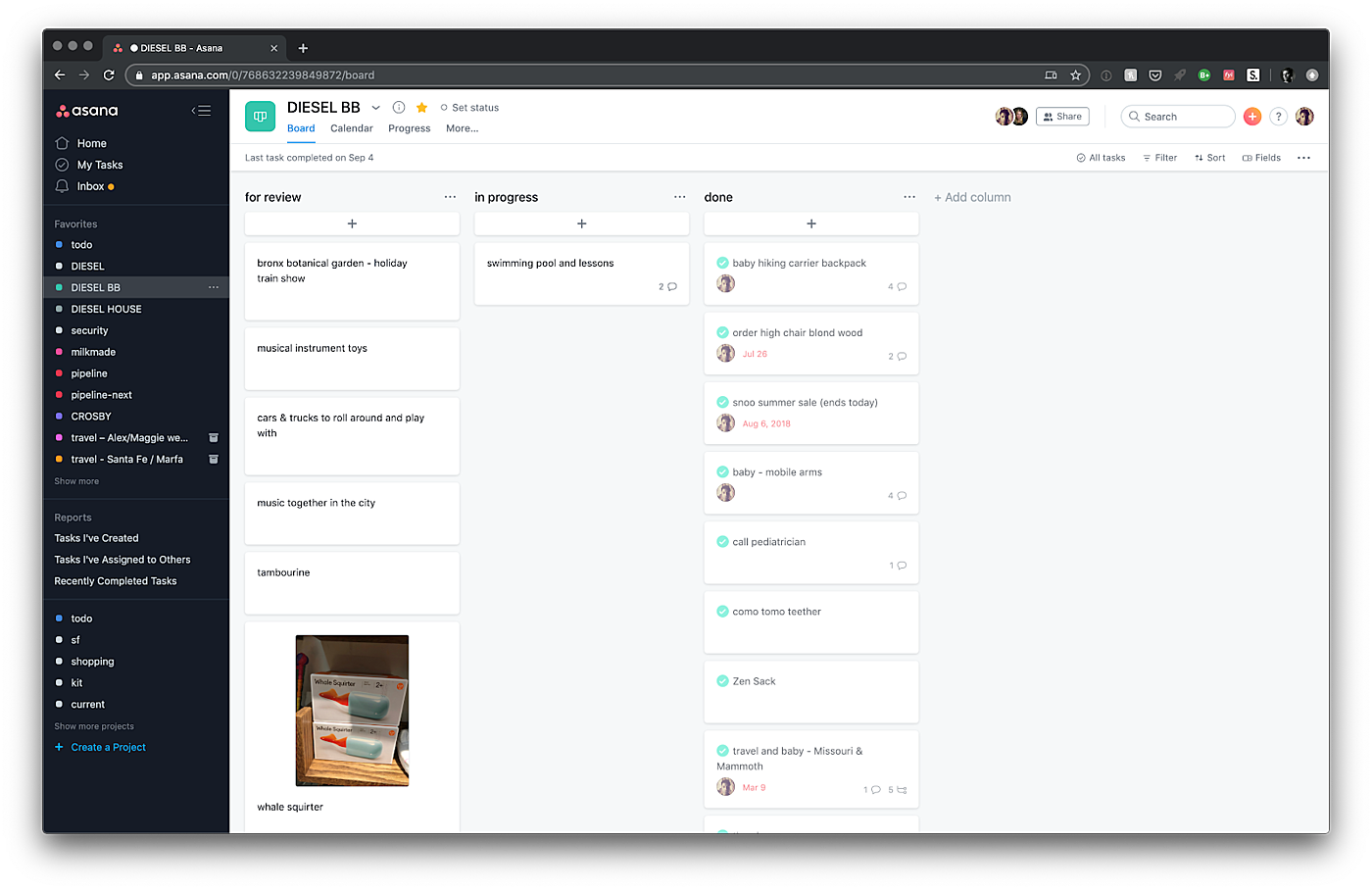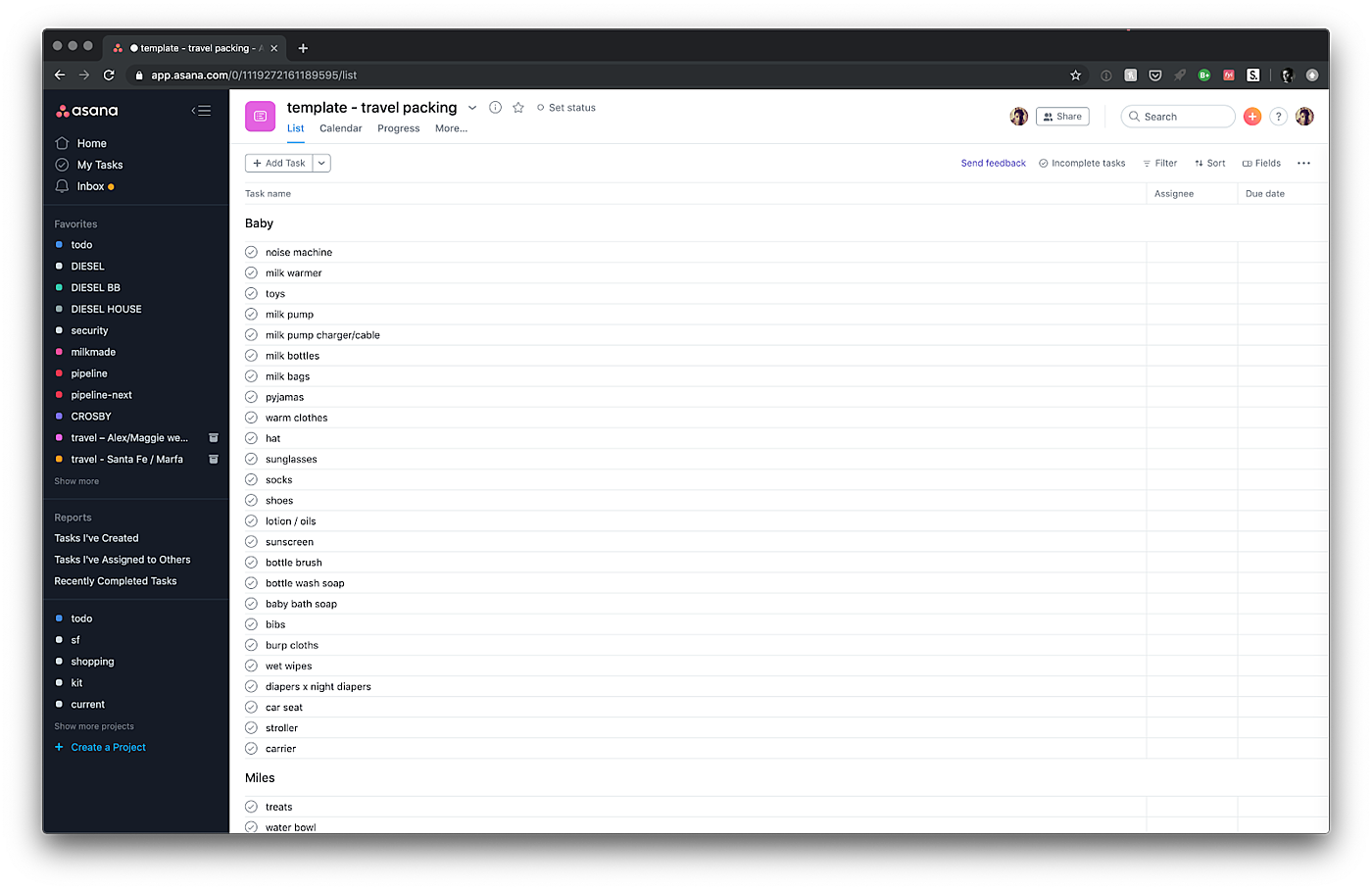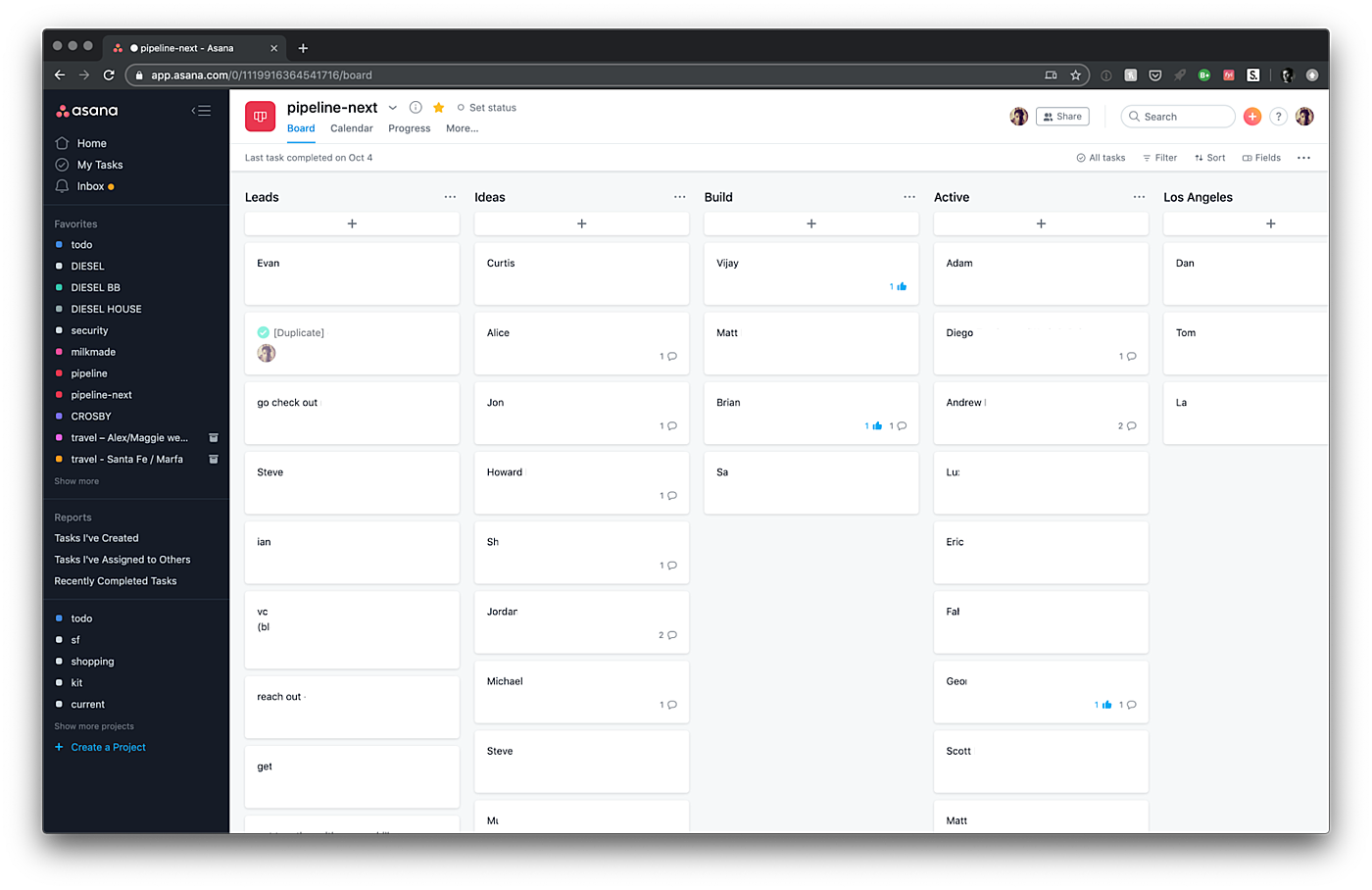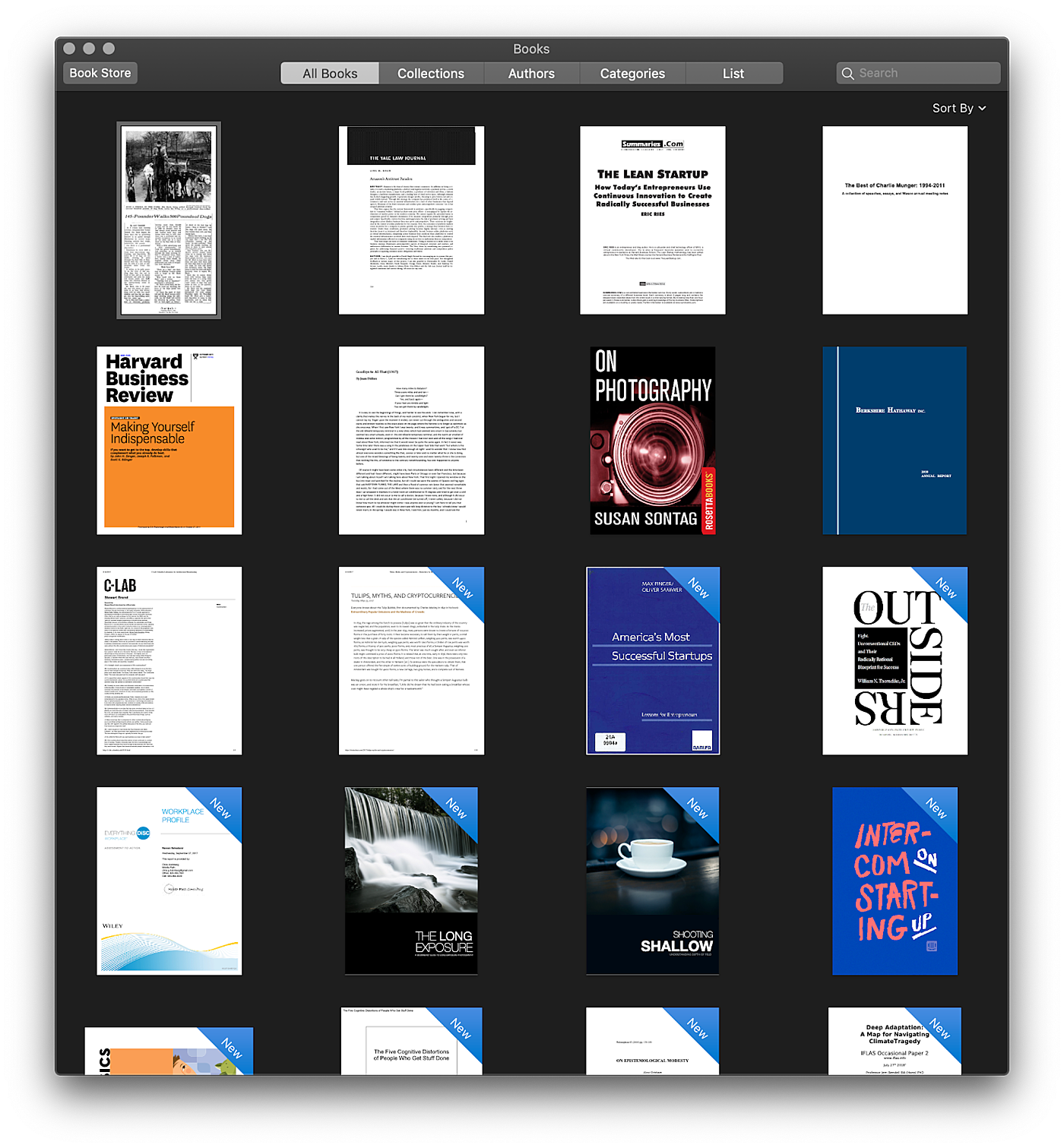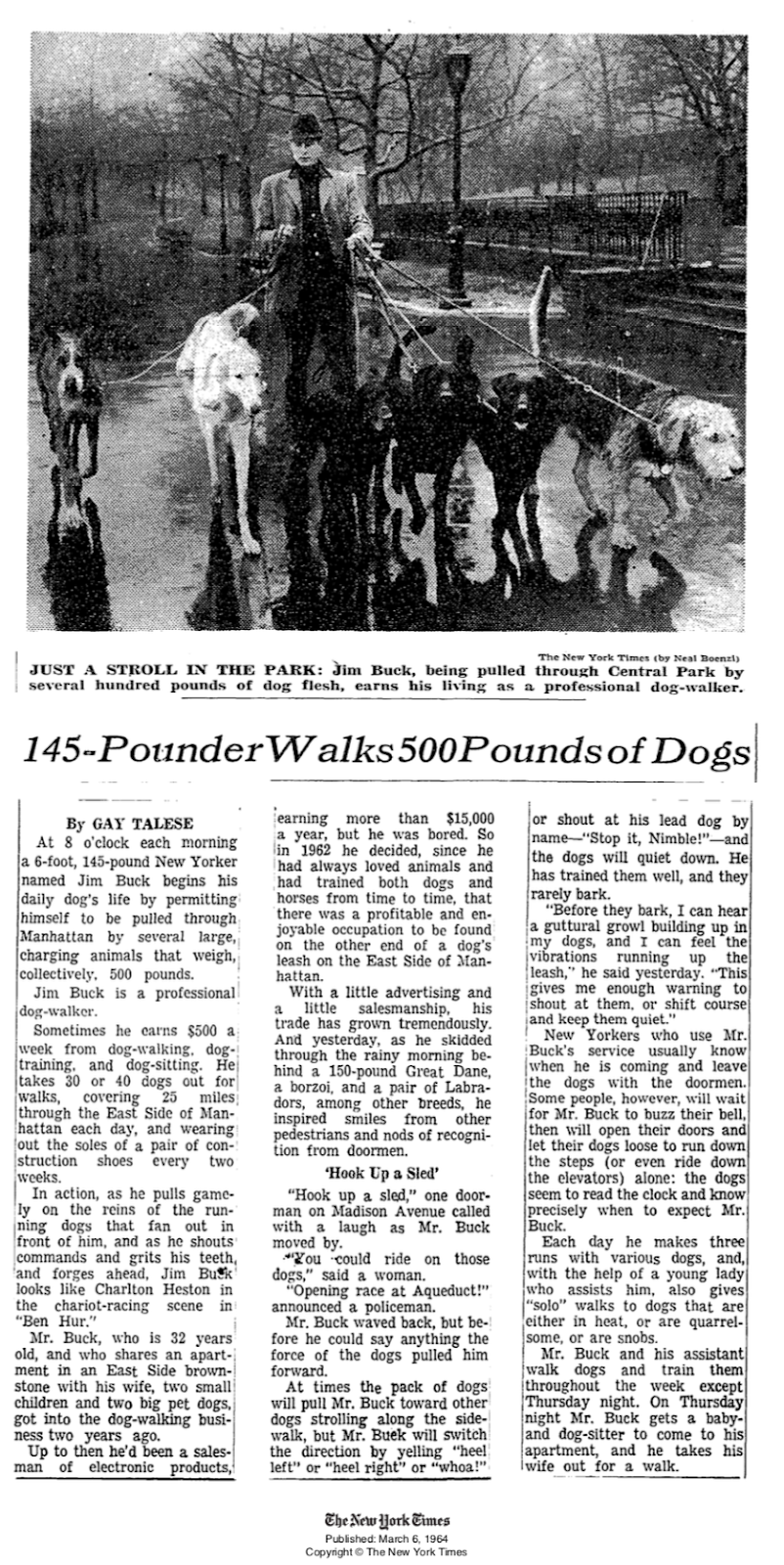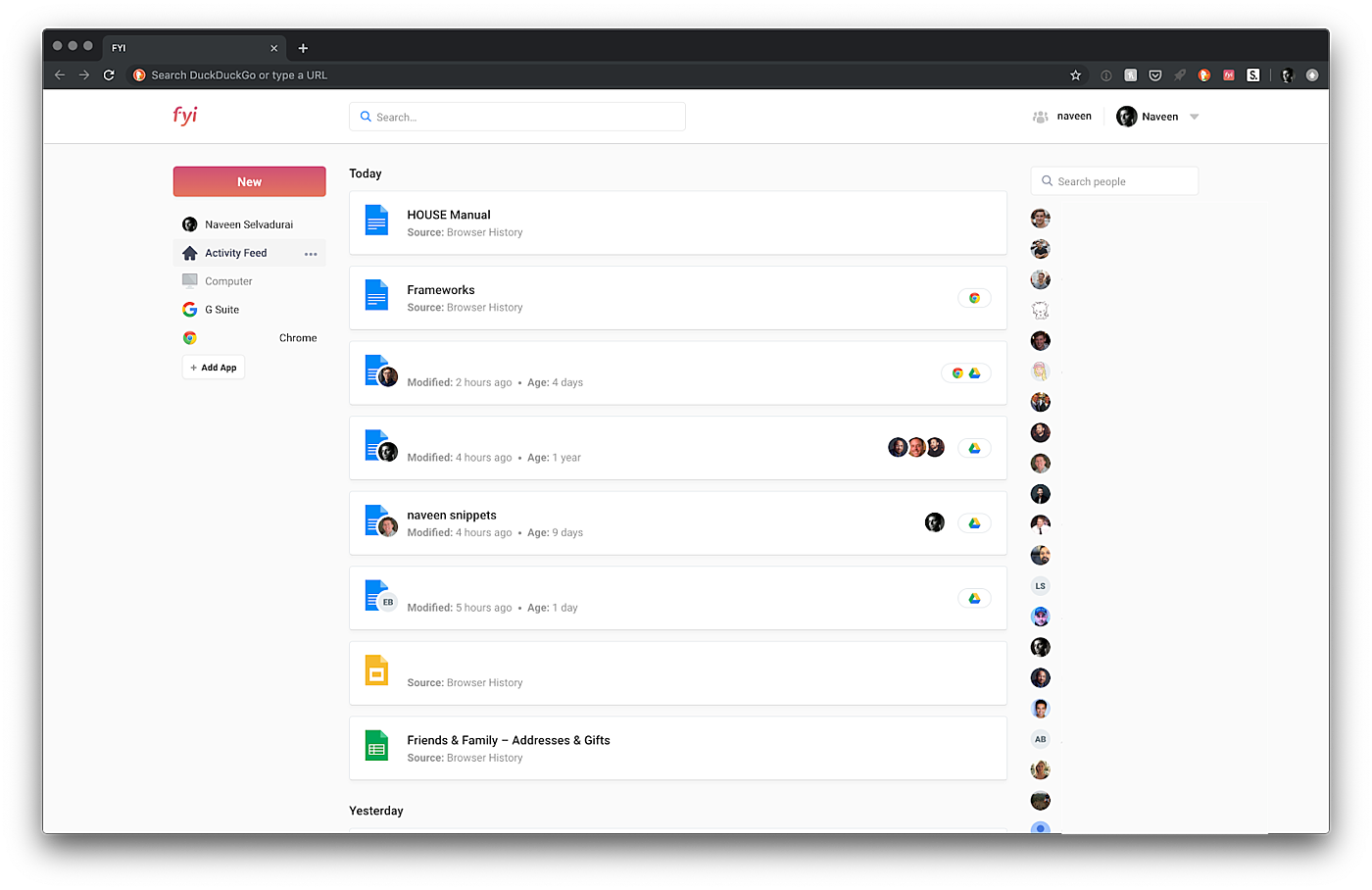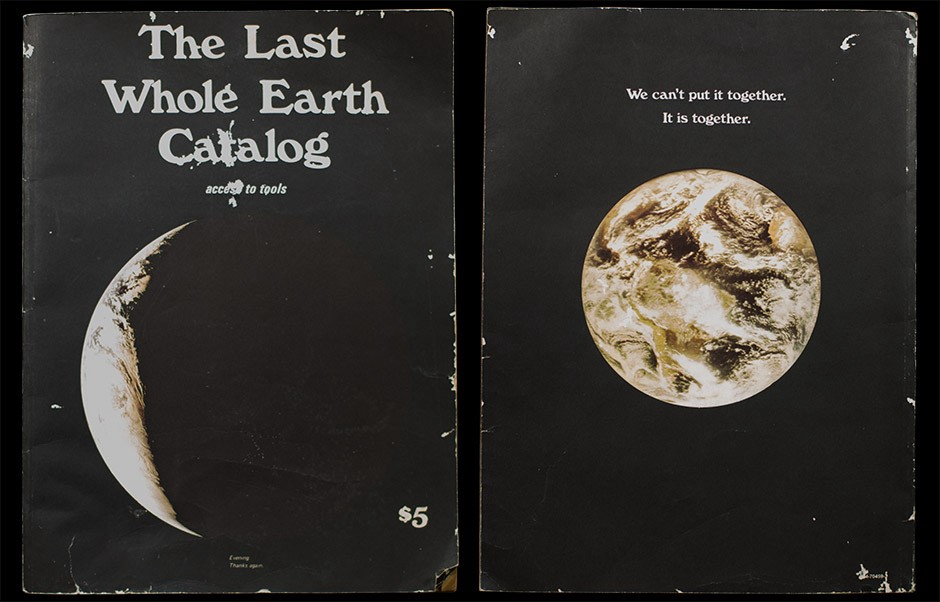
How Naveen Keeps Track
The co-founder of Foursquare tells us about the systems he uses to start companies, remember what he reads, and prioritize his time
October 23, 2019
Naveen keeps track.
For a while, he had a personal API project where anyone could access basic stats about him like how many hours he slept at night, and how much he weighed in the morning.
For over a decade, he's been recording quotes, and images, blog posts, and articles in a digital commonplace so he can always find them later if he needs them.
He even tracks his family life: recording everything from packing lists, to gift ideas, to potential family outings in an Asana he shares with his wife.
But this theme of tracking extends far beyond his personal life, it also extends to his life's work.
In 2009 he co-founded Foursquare, the original location-based social network that allowed users to track places they visited. It's now a $100mm a year behemoth with more than 300 employees.
In 2015, he launched Kit to allow creatives to keep track of their favorite products, and sold it to Patreon.
Now a partner at startup-studio Expa, he's a peripatetic entrepreneur, hanging out at friends' offices while he looks for his next thing. (He keeps track of that too, logging people and meetings in a personal CRM he's created in his Asana.)
He's cool, in a subtle and compelling way. He speaks softly and carefully, curating sentences like every thought could be permanent.
Because for someone who tracks things like Naveen, in a way, they are.
We sat down to chat about this theme of tracking in his life, and explore the systems he uses to start companies, and manage his family life.
In this interview we cover:
- How he uses tracking to set and adhere to goals
- How he keeps a digital commonplace to record things that inspire him
- How he uses his Apple Watch to keep fit, and Streaks to keep his habits up
- What he does when he falls off the wagon
- How he balances his commitment to his family with his work
- His addiction to Asana to help him plan his personal life and his work life
- The personal CRM he's built to help him find his next project
Let's dive in!
Naveen introduces himself
My name is Naveen. I'm an entrepreneur that has started a few companies in the past, including company called Foursquare. Presently I'm a partner in a startup studio called Expa.
I've been working in the tech world for almost 20 years now, starting with a couple of big companies way back in the past, like Lucent and Sun before I got into startups.
When he started tracking things about his life
A lot of these concepts started way back in college, for me, with tracking books.
Basically, I realized I wasn’t reading enough. I wanted to read more, and I wanted more diversity in my information diet. So I set a goal that I wanted to read 10,000 pages in a year.
Back then I was just crudely tracking everything in Excel. And I just kept a log of books that I read, interesting passages, even ratings for the books.
Doing this type of tracking helped me understand how I was doing relative to that goal. So that’s what was valuable about it for me.
But it’s not just about being goal-oriented, there’s another motivation too. I came up in a time when everything was digital, you know. And if everything is digital, and storage is nearly free, and cameras are making it easier to capture everything — I thought, why not just capture everything? It might be useful in the future; you never know.
So that’s what I started to do. I even kept an archive of my old emails and stuff. Before Gmail existed, our email existed on various servers, and I would just download and keep it because you never know when you’re going to need it or want to look back on it.
He uses a digital commonplace book to keep track of what he reads
I use a commonplace book to keep track of interesting things I come across. It’s an idea that has been around for centuries now.
My commonplace book is a private WordPress blog just for myself. And that's where I've been capturing snippets of things: quotes, PDFs that are interesting that I might read, a sign that I saw somewhere that’s interesting but wouldn’t post to Instagram, things that I might have heard at work, you know. All that's got to go somewhere. So I capture it in my commonplace.
It's got a live URL, but I don't share it. I'm not sure how to deal with it. I’ve been asking myself, Should I share it? Should I not? So I've just kind of kept it private for now. Someday I might do something with it.
But it's basically a very simple WordPress blog. I don't need it to be fancy, right? There's nothing complicated that needs to go here. I kind of want to redesign the theme a little bit so that actually see the tags and or search on the right side. But for now I just want to capture.
This is a poem that my wife actually found. She read it at her friend's wedding this past weekend. This Indian poet, Rabindranath Tagore, wrote it, and it’s definitely shot to top ten best poems on my list. I was like, “How have I not heard this before?” So if I find something like that, I have to keep it.
The beauty of WordPress is that you don't have to overthink it. It's open source. They've been around for 16 years, they're probably going to be around for another 16 years.
Whenever I use a tool like this I’m asking myself, are they going to be around? Is the datacenter going to be around? What is the data format? Who else is seeing my data?
I know WordPress is probably overkill for what I'm trying to do here. But it works. So why overthink it?
He uses Pinboard as a link-based commonplace
The other thing I've been doing along those lines is collecting links into a central place.
I’ve been doing this for a long time, since 2005. I started with del.icio.us, but right now I use Pinboard. It’s my link-based commonplace. It’s just an easy enough way to log whatever I come across.
I even have it set up to actually auto capture links from my Twitter as well. So anything I tweet or capture snippets of on Twitter automatically gets captured here.
So using Pinboard I can go back to all of these old areas of my life, and see them.
I used to work at a startup that got acquired by Sony way back in the day. So I can go back can see all the projects I worked on, interviews I did, the patent we had back then in 2005. All this stuff is just logged here going way, way, way back.
Part of the reason to use it is, you know, we've been on the web for what, 25-30 years, right? How many of the URLs that were around 10 years ago are still around? There are so many great sites from the past are just gone. Where are they now?
So Pinboard is my solution to that because it actually saves a snippet of the web page for me. So even if the original page goes away, I can still find it.
He collects startup knowledge into a playbook
The other thing I do is I have a playbook of startup knowledge that I collect.
Some of that is actually public on Pinboard. So, you know, anything I learn about entrepreneurship, building startups, VC stuff, essays or anything that other people have written, actually go here.
So if you actually go to the tag, playbook, you can see everything I’ve saved about startups.
I’ve been thinking about making the rest of it public, so you can see everything in my commonplace that’s playbook related. But I haven’t gotten around to it yet.
On what he goes back to look at
I keep a lot of quotes in here that are things I’ve heard from people I know. It’s not just famous people, it could be advice that was given in a particular moment that was said in just the right way. Sometimes you’re having a difficult moment, and there’s a one-liner that really stands out. Those things are captured here, and sometimes I’ll go back and look at quotes like that.
One of my most favorite things that someone said to me a long time ago, “Write your own story before someone else does.” A friend of a friend said it, and it’s something that I’ve gone back and looked at, and even shared with other people.
So having it captured in my commonplace helps me make sure that I don’t forget it, and helps me go back and look at it when I need to, or share it with someone else if I want to.
How he uses the Apple Watch to encourage his fitness
One thing I do is just close my rings on the Apple Watch. Really simple. I got it, I think, a week or two after we had our son. You don’t get a chance to do much except stay at home to take care of the baby, so I got really into closing the rings every day, or trying to.
I think it just makes it fun and it just sends you light reminders towards the end of the day. I’ll be about to go walk the dog, and it says, “Hey, you have 150 calories to go. Just go on a fast walk with the dog and you'll close the ring.” And that’s really helpful for me to stay on track.
It’s also just helpful now that we have a baby, because I can do things without a laptop or a phone. Often, I'm holding the baby so I can’t get to the phone. Or I don't want him to see the phone, because I'm very conscious about being around the screen when he's there in the room. And the Watch makes that much easier to do.
He uses Streaks to help him build habits
Another app I’ve loved more recently is called Streaks. I think I heard about it from Justin Kan.
Streaks helps me keep habits. So it’s helpful for my wife and me because we’ve been trying to keep to a vegetarian diet, and trying not to drink. I’ve also been trying to floss and read books every day. The goals I’m focusing on change every few months, and Streaks just provides a simple checklist at the end of the day to make sure I’m on track.
It’s helpful because you just go in the app and check it off, and it records how many days in a row you’ve done the habit. And it does the same thing as the Apple Watch where, at the end of the day, it says “Hey, did you floss your teeth? Did you read 15 minutes today?” And it helps keep me on track.
It costs $5 in the App Store, and it's so beautifully designed. Totally worth it.
What he does when he falls off
I drop off all the time. I think the key is to just not let it stress you out too much. It's going to happen. You can't always be super perfect.
Just make sure to get back on the next possible day. Otherwise you’re just overthinking everything.
I think I'm leaning more on the routine now than ever before. I've always been kind of an early morning, get up, get into the groove, get the day going kind of person. Then we got a dog and you have to be even more disciplined. And then we had a baby, and you have to be even more disciplined with your time.
It feels like, okay, we only have 24 hours, right? Everyone else needs your time. So you have to have a routine. But within that routine you’re like, okay, I forgot to eat vegetarian today. Okay, great. No big deal. Just start over again.
I think it's important to have a routine. But I think if you're too strict, then you're just not having fun, right?
How having a family affects his priorities
After I got married, got a dog, and had a kid, I felt simultaneously like, Oh my god I don't have any more time left. But also at the same time weirdly, I was like, wait a minute, what was I doing before?
You realize that you wasted so much time before. And now I’ve filled my life with all this love. Now I have less time, but I’m like, wow, we have a unit.
We have our own family of four. A wolf pack of four. There’s something great about it. It's weird, I can be in both mindsets: oh my god, I just don't have enough time to get work done or, you know, clean the house.
But at the same time, have this feeling of, this is just glorious.
There's really so much time. 24 hours really is a lot of time to get things done if you use it right.
Why he picked Asana for todos and task management
I am a huge fan of Asana. A lot of people probably use Asana in a work context, but I started using it first actually in a personal context, and then I started having my teams work with it.
I use it because I think it will stick around forever, you know. The idea that our todos are going to go away when a company shuts down; that’s weird.
Asana feels like a solid choice because it’s built by an ex-Facebook team led by Dustin Moskovitz and they have enough money that they're going to be around for a long time. They're going to build it in the right way. So I have more than enough confidence and trust to put everything in there. So that's why I chose it in the first place and now I'm really addicted.
It’s also great because I can use one tool. If I think of something right now, I just launch one app. And then I say, is this for work or is it for personal, or is it for something else? It all goes in the same app. So that's why I really love it.
I use it with my wife, and we have a project for the baby, and we have a project that's for us. We use it to help keep track of all the things that we need to share, and talk about, and do.
So when I'm on the go, whatever I'm doing, I just go here and boom, boom I can input whatever the todo is. Then later on, I can catalog it into projects and teams.
He uses Asana to organize his personal life
DIESEL is a codename we have for our family. So DIESEL has a board, and anything related to the family goes in here.
Anything from, we have to get flu shots to we have to buy gifts for our friends and family.
We also have a board for the baby. So, if we think of any interesting ideas they’ll go in here for review later.
For example, here's a great idea: there's a holiday train show at the Bronx Botanical garden that we might want to go to – someone told us about this in passing. So we just log it in the baby project in Asana and then when the time comes we can come back and go see it.
It's gotten to the point in my addiction to Asana that when we go away on a trip, I'll actually create a project for the trip. Sounds crazy. But it's a checklist of like, “Make sure you bring these 17 things for the baby.” Because if we miss one, life is going to be a bit harder on the road.
My friend Eric Friedman actually equated leaving the house with a baby to be almost like going to space: you have to bring all the backups, you have to bring your own oxygen, and you have to bring the duct tape.
And so I have it all saved as a template, so I don’t have to type it every time. I’ll clone the template for each trip and then make some modifications depending on where we’re going.
And it’s so useful because, you know, I’m going away at the end of the week and I don't want to wake up on a Thursday morning at 7am and try to remember everything. This helps me make sure you don’t forget anything.
It's like that scene in Home Alone where she leaves Kevin at home. And then she’s in the air and she realizes she forgot him: “KEVIN!!
That’s what this helps me avoid.
Using Asana to find his next project
I'm actually in between ideas right now looking for the next interesting thing to build. And we don't have an office for a couple months while we’re moving into a new space. So I'm using this time to just wander in different neighborhoods, get into collisions with other people, get excited about new ideas.
So what I've been doing is I actually created this Asana project called, Pipeline Next. It's an extension of my Asana CRM, nicknamed Pipeline, of great people I know or want to meet.
So these are about a hundred or so people that I’m either touching base with, or getting intros to, and just jamming on ideas with.
And Asana is good for this because it’s not overkill. I can put everything in here, and just keep it simple. It’s not a perfect CRM replacement, but it does the job of tracking, which is all I need.
Using systems to respond appropriately under stress or time crunch
I think I started writing stuff down because I knew I was going to forget.
And the busier you are at work or the more stressed you are the more important this is. I've definitely been in moments where the amount of stress is so crazy that you don't even remember what you talked about an hour ago. So I think these are habits that I picked up in moments like that.
The second thing is I'm now a head of household – the team lead.
The dog isn't going to pack his own stuff. Someone else has to do it. And knowing that I don't have a good memory or I can be stressed in that moment, and I'm going to forget something, these are systems to help prevent that. And prevent the additional headache that comes with it.
At the end of the day you do forget stuff anyway, and that's okay. I'm sure almost every trip I’ve forgotten something. This is not foolproof. But with a system you probably forget, you know, half as many things instead of all of them.
I got inspired by one of my favorite short books, the Checklist Manifesto. And it just reminds you that whatever you’re doing, whether it’s packing for a trip, or flying a plane, or preparing for surgery, these basic little systems can help. Make a checklist to make sure you’re doing the right things in the right order.
Using iBooks to save PDFs
Recently, I started using iBooks to save PDFs. Just decks or research papers. I realized that there’s no good, easy tool for saving and browsing PDFs. There are a couple of crude open-source tools out there, but I’ve found that iBooks captures everything that I’d want to refer back to and has pretty good search – and works on mobile.
For example, this is an article by Gay Talese at the New York Times about one of the first dog walkers. It’s this guy Jim Buck who used to walk dogs in New York City back in the day. Look at him, dressed all nice.
I wanted to send this to my dog walker, and so I pulled the PDF. Then I saved it here.
And I have it now because this is going to be hard to find in the future, I think. So now I have it locally on my computer, and I can always find it easily.
The things that Google doesn’t see
I have a concept that I like to call ‘The things that Google doesn’t see’. Companies like Google and Facebook, they’re seeing all of the things we’re posting on social media, the stuff we’re posting on our blog, stuff that we’re getting out in to the world.
And they make all of this stuff searchable, it's already out there. But I think a lot about the things Google doesn’t see. For example, it doesn’t see my commonplace book.
But what would happen if we made all of that stuff searchable?
One tool that’s starting to do this is called FYI. It’s built by Hiten Shah, and I love, love, the stuff that Hiten does.
It lets you search through all of your cloud files like, Drive, and Dropbox, and Evernote with just one tool. But what I particularly love about it is that they’ve built into the new tab flow of Chrome.
So every time I open a new tab, I can instantly search through all of my files without having to click anything. It’s very convenient.
Picking simple tools
Basically, my philosophy on everything I use is to pick the simplest, easiest, tool for the job. It’s sort of like, “the best camera is the one you have with you.”
You could spend forever and ever thinking about how to optimize to the right feature-set and this and that. But at the end of the day, you don't even know if the tool is going to stick around. You don’t know who's going to update it.
That’s why I’ve said, for the most part, “Okay, let’s not over think this. We don’t need to use any fancy tools. Let’s just use Pinboard. Let’s just use WordPress. Let’s just use Asana.
They each have a lot of features I won’t use, but that also means I won’t be reaching to find a particular feature when I need it most.”
Book Recommendation: The Whole Earth Catalog
One of my favorite books actually is not really something I would recommend you sit down and read end to end, but it’s still great. It’s the Whole Earth Catalog.
If you go back and do the research, it’s amazing how many people it’s touched and inspired. It inspired Kevin Kelly to go do the stuff you see with Wired Magazine, and then inspired him to go do his project called Cool Tools (which also became a large printed book in a style similar to the Whole Earth Catalog).
And of course, it inspired Steve Jobs. That line from his commencement speech, “Stay hungry; stay foolish,” came from the last page of the 1974 Whole Earth Catalog.
More broadly, it just touched a lot of people in the Valley. It captures California culture, it captures tech. We needed those types of minds, and that type of craziness.
And it’s called the Whole Earth Catalog because when it was published in the late 60s, it was during the time when we first went to space. That’s the first time we actually looked at the Earth in its totality with our own eyes.
So it’s this idea that there’s only one Earth. We have to take care of it.
So that’s what’s interesting to me about it.
Dan Shipper is entrepreneur and writer living in New York City. You can reach him on Twitter at @danshipper, or reply to this email. If you liked this interview subscribe below to get more like these in your inbox every week!
The Only Subscription
You Need to
Stay at the
Edge of AI
The essential toolkit for those shaping the future
"This might be the best value you
can get from an AI subscription."
- Jay S.
Join 100,000+ leaders, builders, and innovators

Email address
Already have an account? Sign in
What is included in a subscription?
Daily insights from AI pioneers + early access to powerful AI tools

